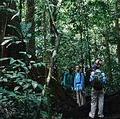 為了保護非洲最原始卻備受威脅的雨林,法國與喀麥隆達成了「外債換自然」(debt-for-nature)協議。依條約內容,法國在未來5年內將至少投資2500萬美元,來保護剛果河流域部份區域,這個僅次於亞馬遜河的全球第二大熱帶雨林。
為了保護非洲最原始卻備受威脅的雨林,法國與喀麥隆達成了「外債換自然」(debt-for-nature)協議。依條約內容,法國在未來5年內將至少投資2500萬美元,來保護剛果河流域部份區域,這個僅次於亞馬遜河的全球第二大熱帶雨林。
這片廣大的森林涵蓋1500萬平方公里,橫跨剛果民主共和國、剛果布拉柴維爾共和國、喀麥隆東南地區、中非共和國南部、加彭、和赤道幾內亞。這片森林棲息著大猩猩、豹、黑猩猩及非洲象,但這些動物因人口增加、非法伐木及土地改作農耕而飽受威脅。
這項投資將會來改善保護區經營管理、野生動植物及森林生產,增加社區森林資源與強化社區研究能力。其最終目標是,既能保護及經營自然森林資源,同時也能舒緩貧困問題。
「這個特殊且具歷史性的協議,它的重要性是在於結合債務免除及當地社區和森林的復育,」總部在喀麥隆的世界自然基金會中非區域計畫辦公室主任山姆(Laurent Some)如此表示。
這個為時5年的協議,內容包括由2006到2010年期間,喀麥隆必須利用57億歐元,投資在教育、健康、公共建設和自然資源等四個方面。
在2005年2月,中非國家元首集會舉行「布拉薩區域首長高峰會議」,並簽署第一個區域性保育條約,以及保護超過7%剛果河流域森林的協議。剛果河流域森林是全球第二大熱帶雨林。世界自然基金會認為,這種「外債交換自然」的方式是該次會議承諾的具體表現,也希望其他國家跟隨法國和喀麥隆的腳步。
自2000年起,喀麥隆成立佔地共1,076,190公頃的五個國家公園,到2005年11月止,其他13處地區也將成為國家公園,完成後,喀麥隆約有10%的森林將免於開發的破壞,受到保護。
France and Cameroon have signed a debt-for-nature swap that aims to conserve some of the most pristine and threatened rainforest in Africa. Under the agreement, at least US$25 million will be invested over the next five years to protect parts of the Congo River Basin, the world's second largest tropical forest after the Amazon.
A vast forest covering 1.5 million square kilometers, the Congo River Basin spreads across the Democratic Republic of Congo, most of Congo-Brazzaville, the southeastern reaches of Cameroon, southern Central African Republic, Gabon and Equatorial Guinea.
This forested region is inhabited by gorillas, leopards, chimpanzees, and forest elephants, but they are threatened by growing human populations, illegal logging and the clearing of land for agriculture.
The investment funds will be used to better manage protected areas, wildlife and forest production and increase community forest resources and research capacity. Ultimately, they will help reduce poverty while protecting and managing natural forestry resources.
"The importance of this unique and history making agreement lies in the combination of debt forgiveness and investment in forest conservation and local communities," said Laurent Some, director of WWF's Central African Regional Programme Office, based in Cameroon.
The five year agreement covering the period 2006 to 2010 requires Cameroon to utilize the funds of about 570 million euros, to fund four different sectors - education, health, infrastructure and natural resources.
In February 2005, Central African Heads of States signed the first conservation treaty for the region, and an agreement to protect over seven percent of the Congo Basin forests, the second largest rainforest.
WWF sees this debt-for-nature swap as a concrete example of the commitment expressed by the region's heads of state at the Brazzaville Summit in February 2005, and looks to other nations to follow France and Cameroon's lead.
Since 2000 Cameroon has created five new national parks totalling 1,076,190 hectares. As on November 2005, 13 other areas were about to become national parks. When those designations are complete, about 10 percent of Cameroon's forests will be protected from development.


